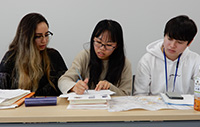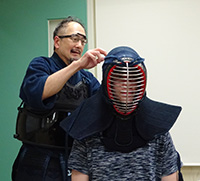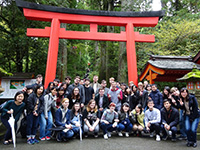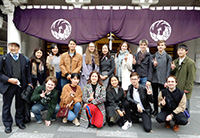Curriculum
Comprehensive Japanese: (JLSP・JLP Common Compulsory)

This course comprises compulsory courses aimed at comprehensively raising students’ Japanese language reading/writing/listening/speaking proficiency. Courses are divided into levels and students study Japanese intensively in small classes of their levels for 150 hours during the term. Up to the Intermediate level, courses are based on textbooks and students comprehensively improve their overall Japanese language proficiency. At the Advanced level, there are separate classes for each language skill (reading/writing/listening/speaking/grammar) and different textbooks and materials are used to enable students to acquire an even higher level of Japanese language proficiency. Activities outside the classroom and discussions with Nihon University student volunteers are conducted to enable students to use and practice the Japanese language skills they have learned.
Elective Japanese: (JLSP・JLP Common Elective)
elective subjects (Communication, Creation, Intercultural Experience, Autonomous Learning) are placed for academic purposes.
Students are able to improve Japanese language proficiency by using Japanese language that you learned in Comprehensive Japanese courses.
Nihon University student volunteers join together. Students are able to choose subjects freely in accordance with their needs and interests.
Japan Studies: (JLSP Compulsory)

Japan Studies Courses are compulsory courses taught in English, aimed at helping students enhance their knowledge of Japanese society, culture and people, think introspectively about questions they may have regarding Japanese culture. Students attend lectures and participate in discussions on Japanese culture, economy and various other subjects.
Intercultural Experience: (JLSP Compulsory)
The aim of this course is to encourage students to acquire the sense of intercultural literacy as well as global perspective by interacting with their surroundings of things and humans. The three Intercultural Experience courses are aimed at raising the awareness of students’ views on Japanese culture, and various friends’ cultures. They give the students’ new perspectives on by allowing them to actual experience of Japanese society and culture while fostering friendship with our volunteers.

○Visit to the Life Safety Learning Center: With a view to better understanding Japan’s geographical characteristics, students learn about the prevalence of earthquakes, fires, and typhoons in Japan and experience simulations of how to respond in case any of these events occurs.

〇Study Tour: The aim of this trip is to enable students to come in contact with Japanese history and nature. Tours visit historically significant places such as Hakone, Kamakura or Yokohama, where students can see famous temples, shrines, other historical landmarks and experience Zazen meditation. In addition, students can enjoy various aspects of Japanese nature during these study tours. During the study tour, each student is accompanied by a Nihon University student volunteer “buddy” to deepen their cultural exchange.

○Seeing a Kabuki Performance: To understand more about traditional Japanese culture, students attend a performance of Kabuki. Through this experience, students can deepen their understanding of the “sophistication” of traditional Japanese culture and how Japanese people enjoy their culture.
*How to take the courses explained above is determined the programs. Please see the Table.
| JLSP | JLP | |
| Comprehensive Japanese | ◎ | ◎ |
| Elective Japanese | △ | △ |
| Japan Studies |  |
× |
| Intercultural Experience |  |
× |
 :JLSP Compulsory
:JLSP Compulsory




